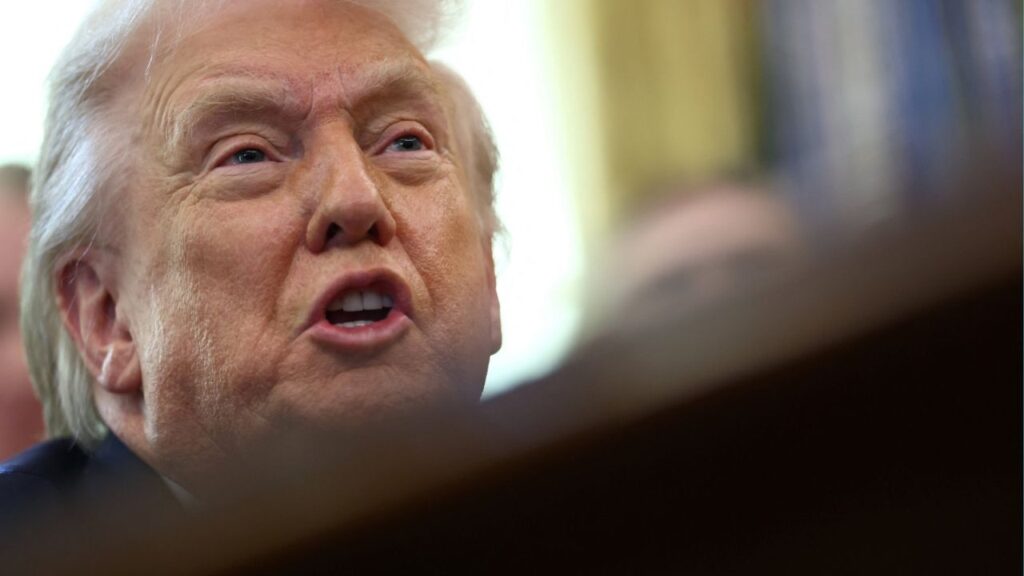A hallway at Roff High School in Roff, Okla., on Wednesday, Dec. 18, 2024. Politicians on both the left and the right have sought to change or limit what teachers can do inside classrooms. Teachers often ignore them. (Joseph Rushmore/The New York Times)

- Teachers report minimal influence from restrictive laws on their curriculum choices and instructional practices.
- The decentralized nature of the American education system makes it challenging for politicians to control public school curricula.
- Social studies, often overlooked in standardized testing mandates, has become a subject with more autonomy for teachers.
Share
|
Getting your Trinity Audio player ready...
|
But in a climate of extraordinary political scrutiny on the curriculum, many teachers say those efforts have little influence on how they run their classrooms.
“I do business as usual,” said Derek Collins, a middle and high school social studies teacher in Roff, Oklahoma.
And in El Paso, Texas, Daniel Gallegos said he was “not at all” scared to hold wide-ranging discussions of racism with his 11th graders, despite his state’s attempt to restrict lessons about the topic.
On subjects like evolution and the causes of the Civil War, there has long been debate over what should be taught. Over the last four years, however, there has been a nationwide burst of political activity seeking to transform the curriculum in public schools.
Most recently, Oklahoma and Texas have encouraged schools to imbue biblical themes into lessons, and Louisiana legislators tried to require schools to display the Ten Commandments in every classroom. Those states and 15 others, all Republican-leaning, have passed laws seeking to restrict how racism and gender can be discussed.
At the same time, a cluster of more liberal states, including California, Minnesota, Oregon and Vermont, have moved in the opposite direction, weaving the activist discipline of ethnic studies into social studies, and embracing concepts from the left, like structural racism and settler colonialism.
Related Story: Board Approves Raise for County Schools Superintendent. How Big Is It?
But the experiences of Collins and Gallegos show how difficult it can be for politicians to control public school curricula. The American education system is “radically decentralized” in the words of one historian. Local schools and even individual teachers are often left to work independently, choosing their own curriculum materials and writing their own lesson plans — a structure that could restrain President Donald Trump in his second term.
Trump has vowed to push a “patriotic” curriculum, while withholding federal funding from schools that embrace left-leaning ideas on race and gender. Both the right and the left have accused the other side of imposing its beliefs on the nation’s children, and social studies educators have felt more pressure to conform than teachers of other subjects, according to surveys.
Despite book bans and other forms of pressure from policymakers and politically engaged parents, there are signs that many teachers are able to ignore — or subtly complicate — mandates to address race, gender and U.S. history in proscribed ways. Only a quarter of teachers have reported that restrictive laws influenced their choice of curriculum materials or instructional practices, according to RAND.
“I’ve never heard of an instance yet of someone actually not teaching something they had taught in the past,” said Tim Bailey, director of curriculum development at the Gilder Lehrman Institute of American History, a nonpartisan group that provides free curriculum materials and training to tens of thousands of teachers.
Related Story: Former Clovis Superintendent Says She’s Running for County Schools Chief
The Least Controlled Subject
Lawmakers from both parties have put American history and civics lessons under a political microscope. But these subjects can be more difficult than others to control.
That is because for years, policymakers seeking to improve academic achievement ignored social studies. Over the past two decades, federal and state standardized testing mandates pushed schools to focus primarily on math and reading.
That meant there was less time and money for social studies education. It also meant more autonomy for teachers of the subject.
In a recent survey conducted by the American Historical Association, two-thirds of social studies teachers said their districts gave them either no curriculum guidelines to work with or only a rough outline of the topics they had to cover.
—
This article originally appeared in The New York Times.
By Dana Goldstein/Joseph Rushmore
c. 2024 The New York Times Company
RELATED TOPICS:
Categories

Teen Arrested at Visalia Mall After Firearm Report

Tumblr Goes Down for Thousands, Downdetector Reports
















